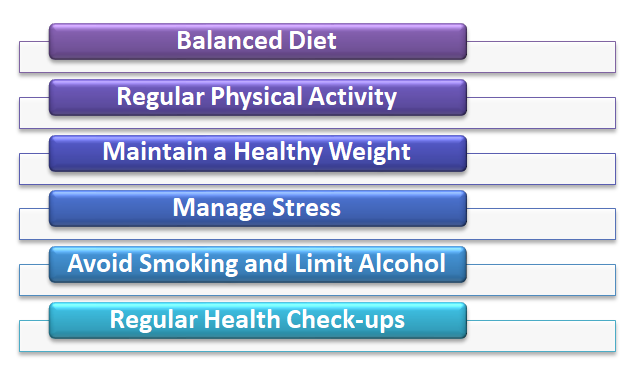
A Comprehensive Handbook for Mastering the Art of Swimming
March 17, 2025
Ramagya Sports Academy- A Preferred Choice for Athletes
March 24, 2025The care you give to your heart is vital to longevity and a healthy lifestyle. The heart’s job is to circulate fluid throughout the body and to supply oxygen and nutrients to each cell. In order to keep your heart in top condition, it is essential to follow the best heart health practices and make educated lifestyle choices.
In this article, we’ll look at the steps you can take to maintain a heart that is healthy starting with diet and exercise for heart health, through managing stress and routine check-ups.
Understanding Heart Health
Your heart is a strong muscle that beats about 1,00,000 times every day, pumping around 22,000 gallons of blood. To keep it healthy, you must make decisions that will support the function of your heart and decrease the risk of developing heart disease, which is the most common reason for death across the globe.
Importance of a Healthy Lifestyle

1. Balanced Diet
- Consume a lot of fruits and vegetables: They are full of minerals, vitamins, as well as fiber, which are good for the health of your heart.
- Choose Whole Grains: Look for whole grains such as brown rice bread, whole wheat bread and oats. These contain essential nutrients and fiber.
- Reduce trans and saturated fats: Reduce consumption of butter, red meat and processed foods rich in unhealthy fats.
- Healthy fats are essential: Include healthy fats such as avocados, olive oil, seeds, and nuts in moderate amounts.
2. Regular Physical Activity
- Try to get at least 150 minutes per week: Exercise regularly to improve your heart health, including moderate intensity aerobic activities such as brisk swimming, walking or cycling.
- Strength Training: Include resistance training exercises at least twice per week to increase muscle strength and improve your heart health.
- Be active all day long: You should take breaks and get moving if you are working at an office job. Also, make use of stairs instead.
3. Maintain a Healthy Weight
- Determine your BMI: Body Mass Index (BMI) can help determine whether you’re in an appropriate weight range.
- Portion Control: Be aware of the portion sizes and try to avoid eating too much, particularly high-calorie food items.
- Consult a Dietitian if needed: If you require a dietitian, consult a dietitian. Ask a professional for advice on specific weight management strategies.
4. Manage Stress
- Practice Relaxation Techniques: Engaging in relaxation techniques such as deep breathing or meditation, yoga or other activities can help lower stress levels.
- Prioritize Sleep: Ensure you get at least 7-9 hours of restful sleep each night to replenish your mind and body.
- Find Support: Talk with family members, friends or a therapist when stress is excessive.
5. Avoid Smoking and Limit Alcohol
- Quit smoking: Smoking can damage the blood vessels and heart. Get help from your healthcare provider or programs to quit smoking.
- Moderate Drinking Limits Alcohol: just one drink a day for women, and two drinks a day for men.
6. Regular Health Check-ups
- Monitoring Blood Pressure: A high blood pressure (hypertension) is a significant threat to heart health. Make sure you check it often and be sure to follow the medical guidelines.
- Examine Cholesterol levels: The presence of cholesterol in the blood increases the likelihood of plaque accumulation in the arteries. Regular blood tests are a good way to detect and treat cholesterol levels.
- Check to check for Diabetes: Diabetes increases the risk of developing heart disease. Regular blood sugar tests and monitoring are vital.
Heart-Healthy Tips for Everyday Life
1. Plan Heart-Healthy Meals
- Create Balanced Plates: Fill half of your plate with veggies A quarter of your plate should be filled with lean protein (fish chicken, fish and beans) and the remaining quarter that is made up of whole grains.
- Limit salt: Use spices and herbs instead of salt to flavor your food and select low sodium options whenever they are you can.
- Healthy Snacking: Pick fruits and vegetables, nuts or yogurt in place of snacks that are processed.
2. Stay Hydrated
- Drinking plenty of water: Drinking water helps to ensure that blood flow is maintained, which is essential to heart health.
- Limit the consumption of sugary drinks: Stay clear of sweet sodas and juices as they can lead to weight gain and increase heart disease risk.
3. Practice Mindful Eating
- Eat slowly: Take in the food at a slow pace and allow your body to sense when you’re satisfied.
- Be aware of your body’s signals: Pay attention to your body’s signs of fullness and hunger, instead of eating from habit or a desire to satisfy emotions.
4. Exercise Regularly
- Find activities you enjoy: Find activities you like and are able to remain with for the long run.
- Set realistic goals: Begin by setting small goals. Gradually increase duration and intensity as you gain endurance.
5. Prioritize Sleep
- Create a routine for your sleep: You should go to bed and get up each day at a similar time every day to control the body’s clock internally.
- Make a relaxing environment: Maintain your bedroom cool and dark to encourage restful sleep.
Heart Health Across Different Age Groups
1. Children and Adolescents:
- Promote Active Play: Encouraging children to take part in outdoor activities, and to restrict the amount of time they spend on screens.
- Healthy Eating Habits: Serve diverse, nutritious food options and include children in the preparation of meals.
2. Adults:
- Keep Healthy Habits in Mind: Always prioritize regular physical exercise as well as balanced nutrition and managing stress.
- Be informed: Stay up to date on regular health screenings as well as preventive treatment advised for your age group.
3. Older Adults:
- Be Active: Engage in activities that help maintain strength as well as balance and flexibility in order to minimize the risk of falling and to maintain your independence.
- Attention to Nutritional Needs: Pay particular attention to your nutritional needs and modify eating habits when changes in metabolism and health conditions occur.
Conclusion
In conclusion, maintaining heart health tips is within your reach with dedication to a heart-healthy lifestyle. Remember, small changes add up to significant benefits over time. Start today with these practical tips and empower yourself to enjoy a heart-healthy life for years to come.
Taking care of your heart is not just about living longer, but living better. Your heart deserves the best care possible, so make it a priority in your life. By following these heart health tips, you can ensure that your heart stays strong and healthy, allowing you to enjoy all that life has to offer.



